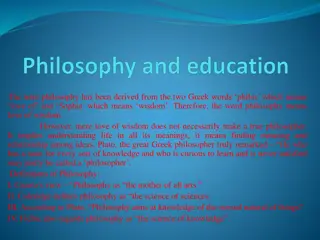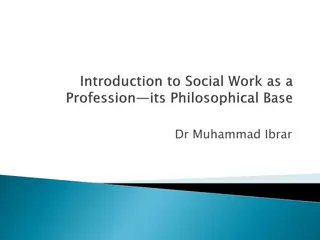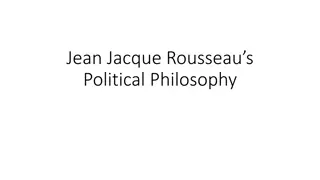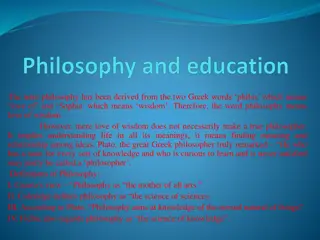Exploring the Political Philosophy of Hans Hoppe
Delve into the political philosophy of Hans Hoppe, a leading successor to Murray Rothbard, known for his contributions in argumentation ethics, criticism of democracy, and social evolution theory. Hoppe's work emphasizes the importance of property rights, rational discourse, and self-ownership in resolving conflicts and understanding human rights. Uncover his innovative approach to ethics and his advocacy for a first-user rule to prevent disputes over resources.
Download Presentation

Please find below an Image/Link to download the presentation.
The content on the website is provided AS IS for your information and personal use only. It may not be sold, licensed, or shared on other websites without obtaining consent from the author.If you encounter any issues during the download, it is possible that the publisher has removed the file from their server.
You are allowed to download the files provided on this website for personal or commercial use, subject to the condition that they are used lawfully. All files are the property of their respective owners.
The content on the website is provided AS IS for your information and personal use only. It may not be sold, licensed, or shared on other websites without obtaining consent from the author.
E N D
Presentation Transcript
The Political Philosophy of Hans Hoppe Mises University July 2022
HHH Background Hans Hoppe was born in West Germany and did his graduate work at the Goethe University in Frankfurt. He studied with Juergen Habermas, a leading member of the Frankfurt School and a Marxist. Hoppe became interested in free market ideas and read Mises and Rothbard.
HHH Background Continued Hoppe came to the United States to study with Rothbard, who was greatly impressed with his work. When Rothbard moved to UNLV, Hoppe joined him and became a Professor of Economics there. He founded the Property and Freedom Society.
Hoppes Contributions Hans Hoppe is the leading successor to Murray Rothbard in political philosophy and has made major contributions in a number of areas. I m going to discuss three of these: argumentation ethics, the criticism of democracy, and the theory of social evolution. As with any important thinker, we need to understand what he is saying first. This is what I ll be trying to do.
The Starting Point of Political Philosophy Hoppe says that conflicts between people arise because of scarcity. Because goods aren t superabundant, people want to use the same resource. In order to resolve conflicts, we need rules that assign control of each resource to one person. All rights are property rights. If we have the right rules, we can resolve all disputes.
Argumentation Ethics Hoppe developed argumentation ethics from the work of Habermas and Karl-Otto Apel. All truth claims must be supported by argument. This can t be denied. You can t argue that you can t argue. We can find out what people s rights are by figuring out the conditions for rational discussion.
Hoppes Innovation What are these conditions? Hoppe s innovation is to answer this question in a different way from the answers of Habermas and Apel. In order to argue, you must own yourself. To deny this is a performative contradiction. My act of denial shows that I do own myself.
Innovation Continued Owning your self isn t enough to engage in argument. Your must also own physical resources. How can these be acquired? Hoppe says only a first user rule can avoid conflict. With other rules, you might claim to acquire property that someone else is using. All rules are universal.
Democracy Many people assume that democracy is a good thing . Isn t it better that people rule themselves, rather than be subjects in a dictatorship? Even if we don t have a dictatorship, isn t it better to decide conflicts by accepting what wins in a fair election?
Objections to Pro-Democracy Arguments Hoppe rejects these pro-democracy arguments. He does so in a book called Democracy: The God That Failed. The title comes from a famous collection of essays published in 1949 called The God That Failed. In this collection, a group of former Communist Party members and sympathizers wrote about why that had abandoned communism.
Objections Continued Hoppe s fundamental objection to democracy is that it ignores rights. If people have rights in the way Hoppe has argued for, there is no room for disputes about how to resolve conflicts. Anyone who interferes with your property rights is guilty of aggression, including majority voters. The majority can t tell you how to use your property.
Whats Wrong with the State? Hoppe says that the anti-democracy argument can be used to support anarchism. A right that stems from self-ownership is your right to self-defense. This can't be given up, even to a supposed minimal state that claims to be limited to protecting rights. Once this right is surrendered, there is no stopping point to the total state.
Difference From Mises Mises has a different view of democracy from Hoppe. According to Mises, the free market is more democratic than political democracy. The consumers are really running things. Capitalism is mass production for the masses. This differs from Hans Hoppe s rights approach.
Democracy and the Short Run Democratic politicians need to get majority support to gain power and to stay in office. What counts for them is what will get people to support them now. They will make promises that can t be fulfilled, because the long run doesn t matter to them. Monarchies tend to adopt a long run perspective. The king expects that his family will be around for a long time, and he will try to run his state in an economically efficient way.
Social Evolution Hoppe uses the two parts of his views that I ve discussed so far, his theory of rights and his criticism of democracy, to develop a theory of social evolution. He is engaging in conjectural history. That is, he is using social theory to offer a rational reconstruction of history. The account of the origin of money by Menger and Mises is an example of conjectural history.
Hoppe and Pessimism The usual account of history emphasizes progress. History starts with a war of all against all. Absolute rule put an end this, and that was eventually replaced with democracy. Hoppe rejects the myth of progress, although he acknowledges the economic takeoff after the Industrial Revolution.
The War of All Against All Hoppe denies that history started off as a war of all against all. That is a falsehood defended by pro-state intellectuals. Instead, people naturally accepted the self- ownership and first appropriator accounts of rights. These aren t made up theories, but a common sense way of settling disputes.
Natural Aristocrats In settling disputes based on these principles, people would tend to gravitate to natural leaders or aristocrats. Feudalism developed from this. Over time, one aristocrat would tend to become stronger than others and become the king. His power was strictly limited by the other nobles.
From Feudalism to Absolute Monarchy The king over time undermined the other nobles by allying with the people. He promised them relief from feudal duties. In doing so, he was helped by court intellectuals who wanted to gain power and influence. They defended absolute monarchy by the myth of the need for a monarchy to rescue people from the war of all against all.
From Monarchy to Democracy The court intellectuals thought that they could gain more power by abandoning the monarch and appealing to the people through pro- democracy arguments. This is what happened during the French Revolution. I ve covered only a few main themes in Hoppe s political philosophy, but I hope I have shown how central his account of rights is in his thinking.























